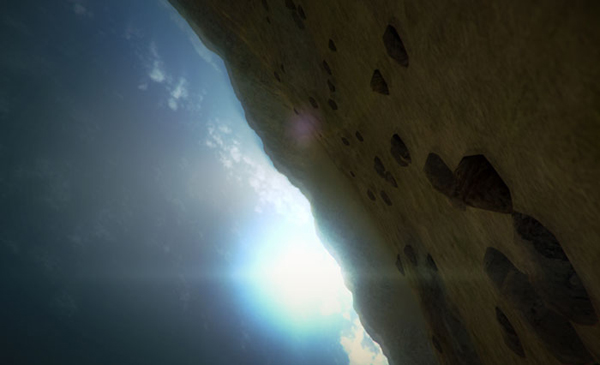Rick Silva's La Région Decentralized is featured this month on The Download.

Still from La Région Decentralized, image courtesy of the artist
Working with nature and land feels natural to me. Nature and land are part of a larger fascination I have with perception, light, and time. I do spend a lot of time outdoors, my new project/blog En plein air http://enpleinair.org is all about that actually. For the project I’m taking my laptop outside and seeing what I can create while reacting to the immediate landscape and elements.
I’m interested in Snow’s use of a rotating camera/horizon. Spinning terrains are a reoccurring theme in my recent videos. Texts about La Région Centrale suggest that the camera/horizon movement in Snow’s film creates a cosmic perspective of space at the human scale, and I agree with this reading. My video game version adds an endless random time component to this idea as well.
In 2010 I used video game engines to generate scenes and imagery for video projects. I’ve used 3D spaces like Google Earth for projects since 2005 with my Satellite Jockey performances, but this is the first time that I’m releasing a game as an application. There is something very interesting in the stretching and randomizing of time that video game engines can do so easily that would be much more difficult using traditional video methods.
I see technology as nature, as Jean-Luc Nancy describes; It is not a question of "nature." "Nature," as it is most often understood, is an abstraction, as is the idea of man standing before it. What is real is the earth, the sea, the sky, the sand, one's feet on the ground, and one's breath, the smell of grass and of coal, the crackling of electricity, the swarming of pixels...

Age: 34
Location: Calgary, Canada
How long have you been working creatively with technology? How did you start?
MacPaint as a kid, mostly cameras and DJ mixers in my teens, somewhere around 20 I bought my first PC so I could make electronic music.
Describe your experience with the tools you use. How did you start using them?
Over the past 15 or so years I’ve used countless configurations of computers, softwares and cameras. Almost always it’s commercial software like Photoshop and Cinema 4D that I use and misuse. And for the last 5 years or so running mostly on Macs. Cameras are usually a light and cheap Canon pocket camera, or a nicer borrowed Sony HD camera.
Where did you go to school? What did you study?
I studied Film at the University of Colorado and received my BFA there in 2001, right after that I did a couple years at The European Graduate School, and then went back to the University of Colorado, this time in the Art Department, and received my MFA in 2007.
What traditional media do you use, if any? Do you think your work with traditional media relates to your work with technology?
The sun. Yes!
Are you involved in other creative or social activities (i.e. music, writing, activism, community organizing)?
I think I’m going to start DJing again.
What do you do for a living or what occupations have you held previously? Do you think this work relates to your art practice in a significant way?
I’ve been teaching New Media art full time for the last 5 years, first at University of Georgia Athens, and now at the Alberta College of Art + Design.
Who are your key artistic influences?
Stan Brakhage, he was at the University of Colorado while I was an undergrad there. I took a class with him my first year there, and at least one more class every year thereafter. And Mark Amerika, whowas/is also at the University of Colorado, I took one class with him my last year of undergrad, we began to collaborate on a few things after I graduated, and then I had a chance to work closely with him during graduate school.
Have you collaborated with anyone in the art community on a project? With whom, and on what?
Mark Amerika and I have worked on various projects throughout the years, most recently I curated and remixed works for his remixthebook project. I also work with Michelle Ellsworth for her stage performances and websites. I’ve collaborated on several net art projects with Marisa Olson and Jimpunk, and on live A/V projects with musician/artists like Adam Tindale and Michael Theodore. A few years back I was lucky to work on a project with Carolee Schneemann. Plus a whole host of other smaller collabs scattered around the web and on old hard drives.
Do you actively study art history?
Yes, projects like La Région Decentralized, and my 2011 remix of Phil Morton’s Colorful Colorado are kind of excuses for me to spend a long time with one work. In the Brakhage Criterion Collection DVD he has this quote on the menu before his The Garden of Earthly Delights film that says the work “is an homage (but also argument with) Hieronymous Bosh”. I feel like these remixes/versions I make are done in that same spirit.
Do you read art criticism, philosophy, or critical theory? If so, which authors inspire you?
Here and there, I’m mostly drawn to artist writings/theory, so I find myself returning year after year to the texts of Maya Deren, John Cage, and Brakhage.
Are there any issues around the production of, or the display/exhibition of new media art that you are concerned about?
Maybe it should be more like music.

